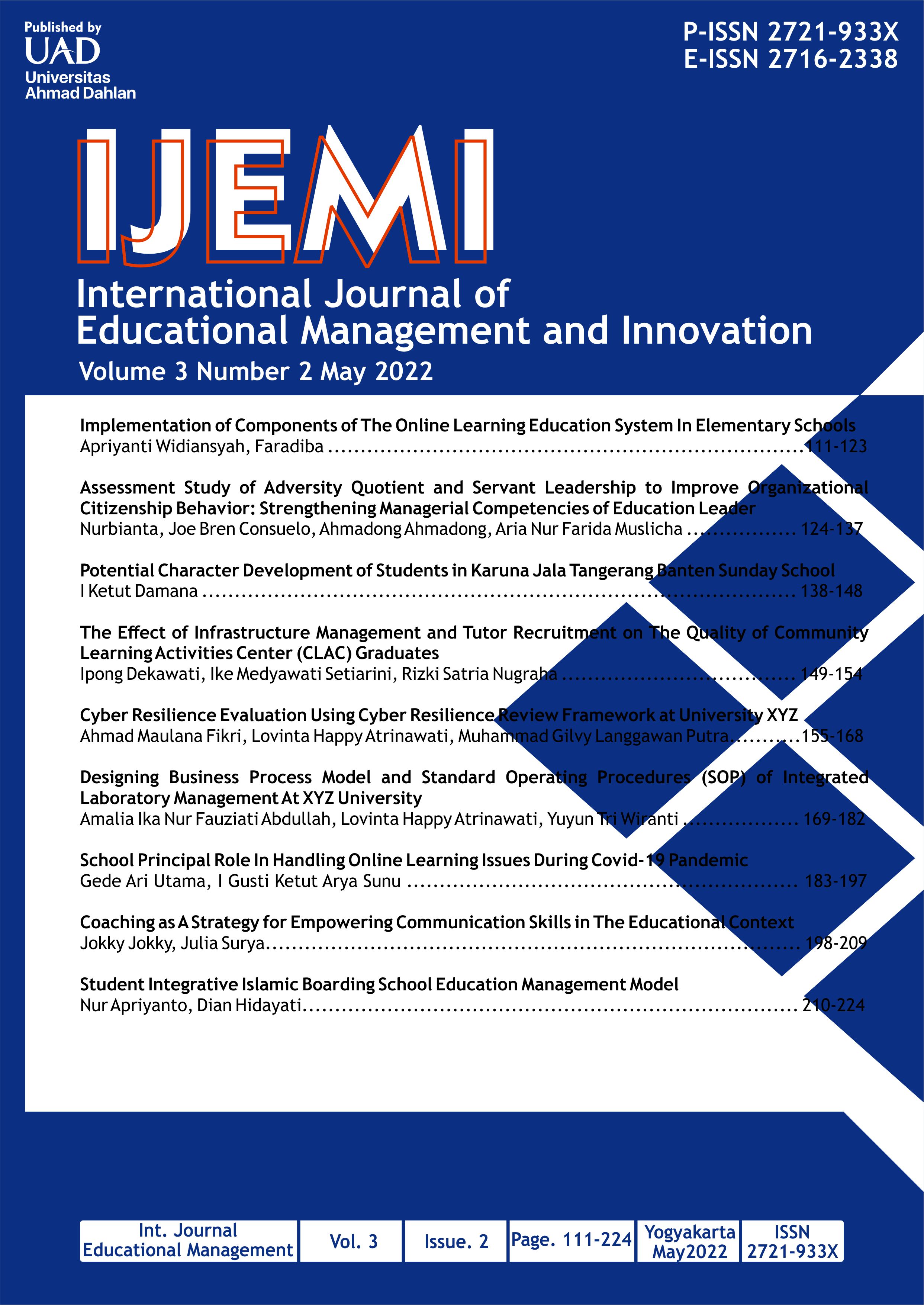Designing Business Process Model and Standard Operating Procedures (SOP) of Integrated Laboratory Management At XYZ University
DOI:
https://doi.org/10.12928/ijemi.v3i2.5795Keywords:
Business process, Integrated laboratory management, Standart operational precedureAbstract
Business processes and Standard Operating Procedures (SOP) are an integral part of organizations as a guideline to do activities to achieve their objectives. However, the integrated laboratory, established in 2020 as one of XYZ University’s facilities to support learning and research activities, does not have an SOP yet. Thus, this study aims to design and develop business process models and SOP documents of integrated laboratory management as instructed in the Regulation of Minister of Research, Technology, and Higher Education Number 71 of 2017. The information regarding the business process was gathered by analyzing other laboratories’ SOP and interviewing stakeholders. The interviewees were the Head of Integrated Laboratory Center of XYZ and the Head and Secretary of LPPM. After being developed, the business process models and SOP were presented to and approved by the process owner. These study outcomes are 25 business process models and 25 SOP documents of integrated laboratory management that have been verified by the Head of the Integrated Laboratory Center of University XYZ. The SOP documents have been handed over to the Quality Assurance Center of University XYZ to be formalized.
References
Atrinawati, L. H., & Pratikta, W. P. (2019). Manajemen Proses Bisnis untuk Institut Teknologi Kalimantan. Jurnal Informatika dan Rekayasa Perangkat Lunak, 1(1).
Dumas, M., La Rosa, M., Mendling, J., & Reijers, H. A. (2013). Fundamentals of Business Process Management. Springer Berlin Heidelberg. https://doi.org/10.1007/978-3-642-33143-5
Dumas, M., La Rosa, M., Mendling, J., & Reijers, H. A. (2018). Fundamentals of Business Process Management (2nd ed. 2018). Springer Berlin Heidelberg : Imprint: Springer. https://doi.org/10.1007/978-3-662-56509-4 Hamidi, M., & Raflah, W. J. (2019). Standard Operating Procedure (SOP) Penerimaan Tamu (Studi Kasus: Politeknik Negeri Bengkalis). Inovbiz: Jurnal Inovasi dan Bisnis, 6(2), 183.
Harrington, H. J. (1991). Business Process Improvement. New York: McGraw-Hill.
Nurhadi, D. (2012). Pengembangan Standart Operation Procedure (SOP) Laboratorium Teknik Mesin di Jurusan Mesin Fakultas Teknik Universitas Negeri Malang. Jurnal Teknik Mesin, 20(2), 7.
Permendikbud. (2020). Peraturan Menteri Pendidikan dan Kebudayaan Republik Indonesia Nomor 3 Tahun 2020 tentang Standar Nasional Pendidikan Tinggi. Jakarta: Indonesia.
Permenristekdikti. (2017). Peraturan Menteri Riset, Teknologi, dan Pendidikan Tinggi Republik Indonesia Nomor 71 Tahun 2017 tentang Pedoman Penyusunan dan Evaluasi Peta Proses Bisnis dan Standar Operasional Prosedur dalam Lingkungan Kementerian Riset,Teknologi, dan Pendidikan Tinggi. Jakarta: Indonesia.
Reijers, H. A., Mendling, J., & Recker, J. (2015). Business Process Quality Management. In J. vom Brocke & M. Rosemann (Eds.), Handbook on Business Process Management 1 (pp. 167–185). Springer Berlin Heidelberg. https://doi.org/10.1007/978-3-642-45100-3_8
Sitorus, E., & Nasution, S. S. F. (2017). Pembakuan Aktivitas Pergudangan dengan Standard Operating Procedure (SOP) in PT.XYZ. Jurnal Sistem Teknik Industri, 19(2), 65–71.
Weske, M. (2007). Business Process Management Concepts Languages Architecture. Springer.
Zuliati. (2017). Studi Penyusunan Standar Operasional Procedur (SOP) Peralatan di Laboratorium FRSD ISI Surakarta. Institut Seni Indonesia (ISI).
Downloads
Published
How to Cite
Issue
Section
License
Copyright (c) 2022 Universitas Ahmad Dahlan

This work is licensed under a Creative Commons Attribution-ShareAlike 4.0 International License.
The copyright to this article is transferred to Universitas Ahmad Dahlan (UAD) if and when the article is accepted for publication. The undersigned hereby transfers any rights in and to the paper including without limitation all copyrights to UAD. The undersigned hereby represents and warrants that the paper is original and that he/she is the author of the paper, except for material that is identified as to its source, with permission notices from the copyright owners where required. The undersigned represents that he/she has the power and authority to make and execute this assignment.
We declare that:
This paper has not been published in the same form elsewhere.
It will not be submitted anywhere else for publication before acceptance/rejection by this Journal.
Copyright permission is obtained for materials published elsewhere and which require this permission for reproduction.
Furthermore, I/We hereby transfer the unlimited rights of publication of the above-mentioned paper in whole to UAD. The copyright transfer covers the exclusive right to reproduce and distribute the article, including reprints, translations, photographic reproductions, microform, electronic form (offline, online), or any other reproductions of similar nature.
The corresponding author signs for and accepts responsibility for releasing this material on behalf of any and all co-authors. This agreement is to be signed by at least one of the authors who have obtained the assent of the co-author(s) where applicable. After submission of this agreement signed by the corresponding author, changes of authorship or in the order of the authors listed will not be accepted.
Retained Rights/Terms and Conditions
Authors retain all proprietary rights in any process, procedure, or article of manufacture described in the Work.
Authors may reproduce or authorize others to reproduce the Work or derivative works for the authors' personal use or for company use, provided that the source and the UAD copyright notice are indicated, the copies are not used in any way that implies UAD endorsement of a product or service of any employer, and the copies themselves are not offered for sale.
Although authors are permitted to re-use all or portions of the Work in other works, this does not include granting third-party requests for reprinting, republishing, or other types of re-use.




